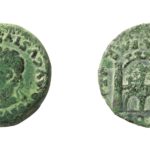From barter to the chip: the past, present, and future of money
Sex, religion, and politics, along with harmony and trust, gave birth to money. At first, there was barter. Later came coins and bills, which have now given way to the network age, a world in which space and time have disappeared and transactions are conducted in bits. In order to understand the present and predict the future, Chris Skinner reflects on the history of money in his book, 'The Next Step: Exponential Life', which can be downloaded online free of charge as part of BBVA’s OpenMind project.

During the millions of years of their history, humans have shared the planet with other hominid species that are now nothing more than skeletons on display in museums, whereas humans are still alive. What has allowed them to survive? Professor Yuval Harari, the author of “From Animals Into Gods: A Brief History of Humankind”, states that only one characteristic of homo sapiens can explain this: their capacity to create and believe in fictions. According to Harari, having a complex communication system allowed us to share beliefs and so live together in groups of hundreds of individuals, which in turn helped the first humans to both survive and rid themselves of their enemies.
| Download complete book | |||
|
|||
This led to the appearance of the first civilisations and, along with them, a new need: the need to organise. In his book, which is published by BBVA, Chris Skinner, Chair of the Financial Services Club and one of the best-known fintech experts, explains how, in the first age of man, goods were interchanged via barter until the nomadic tribes settled down and created the first cities, agriculture, and an excess of goods. In addition, society continued to increase in size and complexity until shared beliefs became the first religions.

Ace of bronze coined between 14 and 37 AD in Emerita Augusta. - Colección BBVA
The second age of man: the invention of money
Money then appeared in connection with religion and those who enforced the law in its name, those closest to the gods in which everyone believed: the priests. In this type of sedentary, agricultural society, where everyone had maize and apples, barter could no longer function. Thus, the rulers, who no longer worked the land, had to invent a new system that would allow them to control the food surplus and business relations. According to Skinner, they had the idea to have farmers give part of their goods to the priests in exchange for money, which at the time consisted of gold, rings, or glass.
But: How were they able to give value to something that previously did not have it? Skinner is certain on this point: by creating and justifying prostitution via religion. Every woman, at one time in her life, had to stay in the temple until a man was willing to pay money to have sex with her. After they had copulated, the woman was then once again free. In this way, the priests were even able to give money a certain degree of sacredness.
The third age of man: the industrial revolution
The world and trade continue to evolve. Money eventually relegated barter to second place and established itself as the preferred payment method in all cultures. Gold, silver, and other precious metals were exchanged for clothing and food, and were used to pay taxes. Nevertheless, the growth that resulted from global mechanization transformed this model anew.
When everyone believes something has value, it in fact acquires value"
The steam engine arrived with the Industrial Revolution and changed our notions of space and time. Both people and goods could be transported previously impossible distances in only a few days. Not even oceans remained barriers to trade. Nevertheless, money became a barrier. Transactions involved increasingly large amounts of money and it was difficult and dangerous to transport bullion. Skinner explains how this fact created a need for a new system everyone could trust.
When everyone believes something has value, it in fact acquires value. One only need consider the difference between a bill of five and fifty units in any currency. If both are made of the same paper, why does a zero make the latter worth ten times more? Because everyone has agreed to believe this is the case. In this way, Skinner explains the appearance of paper money and checks. In order to make the economy more flexible, governments urged banks to begin issuing bills, and people trusted in the value of that paper since public institutions promised to guarantee payment by the banks.

The fourth age of man: the network age
Although the digital era has been transforming the world for only seventy years, the changes it has caused in only a few decades would have taken centuries in previous ages. Globalisation, immediacy, and a reduction in the cost of technology have created a network to which all of us have access to communicate, execute transactions, and trade person-to-person on an equality basis. As Skinner states, this social transformation requires a new monetary system based on the platform that unites all of us: the Internet.
Skinner points out how the network has increased the possibilities of the monetary system, allowed previously unthinkable transactions, and included markets that had been excluded, such as the African market. Skinner estimates that 5 billion people who previously had zero access to digital services are now on the network.
As regards the future of money, Skinner only has questions. Technology has shown that only time is required to make the unimaginable possible. Science and progress are changing our lives at great speed. They meet some needs only to see others arise. Money will thus need to evolve in order to keep up with the unstoppable progress of the digital environment. Will money continue to be exchanged? What will the money of the future look like? What will it be used for?
Chris Skinner ends his book with an even greater mystery: once humans have conquered the network and space and ensured that technology has resolved life for everyone, what purpose will banks, money, and wealth serve?


